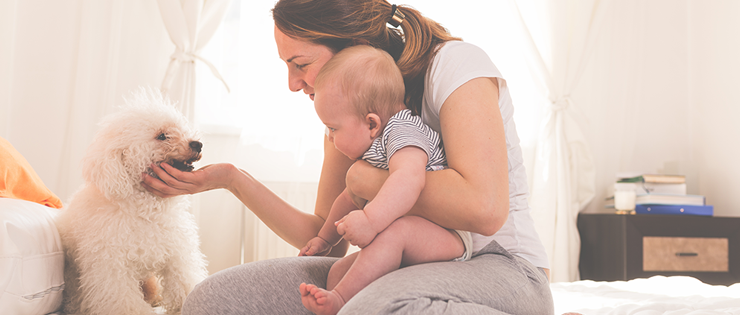
Well firstly, congratulations! You have brought a miracle into this world, and no doubt are overcome with love and adoration!
But, bringing a baby into your life is a time of not only overwhelming love, it is a time of great change and adjustment. Suddenly, your time and energy is siphoned into this new life, with just about every waking moment invested into their health and wellbeing. Whilst this shift in lifestyle comes with great support from our ingrained instincts, it can undoubtedly result in severe stress and anxiety. But regardless of whether you flew through pregnancy and birth with flying colours or found it understandably challenging, new life brings with it a new time for everyone involved.
Naturally, I gravitate to how the dog in the family is affected and find that whilst many dogs are capable of adapting to just about any change to their routine, a large number aren’t.The change to routine is usually the core of the issue for a dog. Being creatures of habit, dogs need predictability in their day as well as a sense of control.
A newborn turns predictability and control upside down for not just a dog, but everyone involved. This can leave the dog experiencing anxiety, frustration and sometimes, even resentment. For me, I become frustrated also as I hear of many new parents allowing their anxiety to motivate decisions such as removing their dog from the family home, ostracizing them into the back yard or even having their dog put to sleep, believing that a dog and baby cannot cohabit. Every new parent wants the best for their family and so whilst these motivations may be what many believe is the best decision for the child, it is invariably devastating for the dog.
One of my passions is to connect people with animals and help them understand that a cooperative relationship with a pet is an extraordinary and mutually beneficial one. Children learn so much from animals, and the lessons a pet can teach are unique.
So, how can you provide a loving home to the humans and four-leggeds in your family equally, without risking the wellbeing or safety of any involved?
I have come up with some tips below to get you on the right track.
Once you find out you’re pregnant, ideally start to transition your routine into one where there is a baby. Involve your pet in as much of this as possible. Painting the baby room, putting together the cot, these are family activities associated with positivity and cooperation.
Purchase a track that plays baby noises during food and relaxation time. Any noise a baby makes should either be positive or at least neutral to your pet. Start to condition this before the baby is even born.
When your baby is born, ask a friend or partner to bring the babies clothes with the scent back home to your pet. Allow them to smell it and put it in their bed as part of their safe place. The smells must be associated with positivity.
When you bring your baby home, ask your friend or partner to hold the baby, whilst you enter the home and greet your dog. Then, allow the dog to see the baby in your arms. Gage the body language of your dog. Most dogs will meet and greet with a sniff and even a lick, which is great. If you are unsure of how your dog will react, contact a qualified behaviourist to help give you the confidence to make the introduction.
Baby = treat. Keep this simple equation in the forefront of everyone’s mind.
Each time the baby cries, or is a part of your family’s attention, the dog should be receiving praise and treats. Instead of giving your dog their food in a bowl, use their daily intake of food as treats for each interaction they have with your baby. Sometimes, this may seem unrealistic, so just try your best. The more you can reward your pet however, the more positive they will feel about their new and important job.
Allow your pet to help out, by encouraging them into the baby’s room when you are needed to attend to feeding or changing their nappy. Dogs love to feel a part of the family.
Provide your dog with a safe place. If this is on your bed, beside your bed or in a place they prefer to go to that is warm, dry and positive, then allow continuous access to this space. This space is never accessible to children no matter what age.
Never leave a baby and pet alone unsupervised. I know this is a no-brainer, but is one of those tips that really needs to be consistently implemented.
The crux of my advice is to essentially ensure your pet is an integral part of the baby’s life. Involve them, have fun with them and allow them to have purpose. Providing you are empathic towards your dog and set up an environment that is both safe and positive, there is no doubt your pet and baby will grow together to be the very best of friends.
HIF Pet Insurance Cover
We all love spoiling our fur-kids, yet only 26% of dogs and 19% of cats in Australia have pet insurance - and that could be very hurtful when the vet bill arrives! With HIF Pet insurance, you'll enjoy affordable cover for cats and dogs of all ages. Plus, claiming is easy thanks to our online member Pet Pawtal!